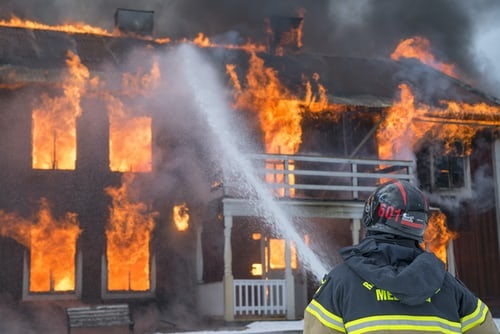As more and more people use high-powered electric and gas appliances in their homes, the chances of fires breaking out are considerably high, especially if appliances have not been installed properly. Nowadays, with global warming and natural fires also on the rise, houses being burnt down and entire housing societies being affected is not uncommon.
One of the biggest problems with fires is when they hit a major fuel source. Many people have generators at home that have large tanks of diesel or petrol, others have cylinders of gas to power common home appliances. If a fire breaks out and reaches one of these fuel sources, the results can be catastrophic. If a liquid fuel tank explodes and fuel gets blown all over the place it can be extremely difficult to put the fire out. Heavy fuels such as diesel don’t ignite very easily but when they are in the middle of raging fire it can be impossible to put them out.
If you happen to live in a brick house then you might be able to salvage the structure of the building after the fire but in the case of wooden homes, the entire property will be demolished by the fire. Insurance claims can also be tricky with fires because it is difficult to locate the source of the fire. The best strategy is to avoid fires all together and to know what to do in the case one does break out. Read on to get some pointers on how to avoid home fires.
1. Check All Appliances
If you are running electric and gas appliances in your home, you need to make sure that these are in good running condition. You can do this by having them inspected by a professional and getting a certificate that guarantees their health. In just the recent past, there were several situations in the UK where faulty tumble dryers had caused serious fires. There are a lot of electric and gas appliances that could pose a safety hazard in your home and regular maintenance is necessary to ensure safety. Also, be sure to check the main connections for all these appliances. For gas appliances ensure that the connections are properly sealed and are not leaking any gas. For electric appliances check that the socket is in good condition and that the wiring looks healthy.
2. Salvage Burned Items
Sometimes it doesn’t take a full-scale fire to ruin your appliances or portions of your home. Even a small spark could cause the entire appliance to short circuit and either malfunction or completely stop functioning. Similarly, a gas burner could also cause a lot of damage just by the residual heat. In any situation, there is nearly always some form of assistance available and you should have emergency contact numbers handy in every room in the house. Getting help at the right time could make the difference between life and death. As for the appliances that get damaged, you can easily sell these off to companies that specialize in buying damaged furniture.
3. Fire Fighting System
Whether you are a shop owner, a homeowner, or you have a manufacturing business, you need to take firefighting solutions very seriously. Having access to the right solutions at the right time can make the difference between not only saving your property but also saving lives. If you don’t already have some solutions in place, you should install some preventative solutions in your home or business just in case. In most areas, these are mandatory requirements by local building authorities but some older buildings might not have them. There are also other solutions such as smoke alarms and fire extinguishers that can be installed in older buildings where a sprinkler system might not be possible. Whatever the situation may be, having some kind of fire protection system is crucial.

Today we have all kinds of appliances in our homes that we don’t realize can be serious safety hazards. This problem is only compounded by the fact that most of these items are either running continuously or are programmed to run at certain times automatically. You might not even notice that something is running, and if there is a fault in the machinery it could turn into a serious problem. Especially with appliances that use a mix of things such as dishwashers that use electricity as well as water. Having even a small spark in the dishwasher or having a bit of cable that is exposed could be the beginning of a fire when it comes in contact with water and starts to spark. Moreover, a lot of the wiring and plumbing is hidden behind walls and cabinets and a spark in that area can easily go unnoticed. Take the necessary measures for your security today to protect yourself from problems in the future.

